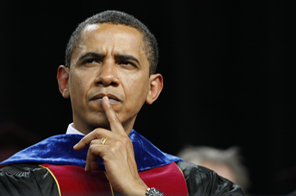US wants democratic Russia
MOSCOW: President Barack Obama said Tuesday the United States wanted a strong, prosperous but also democratic Russia, as he set out his vision of the US relationship with its former Cold-War era foe.
In the most eagerly awaited address of his two-day visit to Moscow, Obama reached out to Russia by emphasising its place as a "great power" but also did not shy away from the differences between the two countries.
The speech to students graduating from the progressive New Economic School came as Obama sought to revive ties with Russia bruised by a string of crises over the last decade.
"America wants a strong, peaceful, and prosperous Russia," Obama told the elite audience of more than 1,000 at the Gostiny Dvor convention centre in central Moscow.
"We recognise the future benefit that will come from a strong and vibrant Russia."
He acknowledged the difficulties in forming a lasting partnership between the two former bitter enemies but said Russia and the United States now shared "common interests" on the main issues of the 21st century.
The challenges facing the modern world "demand global partnership, and that partnership will be stronger if Russia occupies its rightful place as a great power," he said.
Russia has repeatedly been criticised by the West for a lack of full democratic freedoms under the former president and now Prime Minister Vladimir Putin and the new Kremlin chief Dmitry Medvedev.
"The arc of history shows us that governments which serve their own people survive and thrive," said Obama. "Governments which serve only their own power do not."
He also took aim at corruption, widely seen as one of the scourges of Russia's post-Soviet society and something that Medvedev has pledged to end.
"People everywhere should have the right to do business or get an education without paying a bribe," Obama said.
The address was promoted as a landmark foreign policy speech on US relations with the post-Soviet world, following Obama's April Prague speech on nuclear weapons and the June Cairo speech on the Middle East.
In the Moscow speech, Obama quoted from Russia's greatest poet Alexander Pushkin, paid tribute to the country's sacrifices in defeating fascism in World War II and lauded its culture's influence.
Obama noted that himself, his audience and Medvedev were "not old enough to have witnessed the darkest hours of the Cold War."
But he told his audience -- a future Russian elite in business and government -- that "you are the last generation born when the world was divided."
"Your lifetime coincides with this era of transition," said Obama.
"What kind of future is Russia going to have? What kind of future are Russia and America going to have together? What world order will replace the Cold War? Those questions still do not have clear answers," he said.
He also said Russia had to respect the sovereignty of its pro-Western ex-Soviet neighbours Georgia and Ukraine and acknowledged Russia's opposition to the US plan for a missile shield in eastern Europe.
Earlier, Obama had his first meeting with Putin, who told the US president Moscow was counting on him to improve bilateral ties.
Obama praised Putin -- seen by most as Russia's de facto leader -- for his "extraordinary work" as president between 2000-2008 and now in his new post as prime minister.
Putin told Obama in turn: "We associate your name with the hopes of developing our relations."
Obama also met former Soviet leader Mikhail Gorbachev and in a separate encounter talked with opposition activists including fierce Kremlin critics like chess legend Garry Kasparov and ex-deputy prime minister Boris Nemtsov.
But in a meeting with activists he praised Medvedev for taking steps "so that civil society groups can play a more active role on behalf of the Russian people."
Obama also addressed a business forum, declaring that the two sides could do much better than their annual trade volume of 36 billion dollars.
Medvedev and Obama on Monday announced a breakthrough deal for US military transit for Afghanistan across Russia and also issued a declaration on replacing a key disarmament treaty.
The declaration called for a reduction in the number of nuclear warheads in Russian and US strategic arsenals to between 1,500 and 1,675 within seven years; and the number of ballistic missile carriers to between 500 and 1,100.
But Russian Foreign Minister Sergei Lavrov warned that the ambitions of arms cuts could be hit if the United States pursued its plan to install missile defence facilities in the Czech Republic and Poland.
"If our partners decide to create an American missile-defence system with global reach, this will undoubtedly cast serious doubt on the prospects for further strategic offensive arms reductions," Lavrov said.






